Key takeaways:
- Gender equality advocacy requires a shift in mindsets and a commitment to addressing biases and stereotypes in daily interactions.
- Identifying personal triggers and incorporating self-awareness is vital for fostering resilience and proactive responses to gender-related biases.
- Effective communication in advocacy involves active listening, sharing personal stories, and simplifying messages for broader understanding.
- Building a supportive and diverse network, along with mentorship, enhances advocacy efforts and amplifies individual voices in the movement for gender equality.
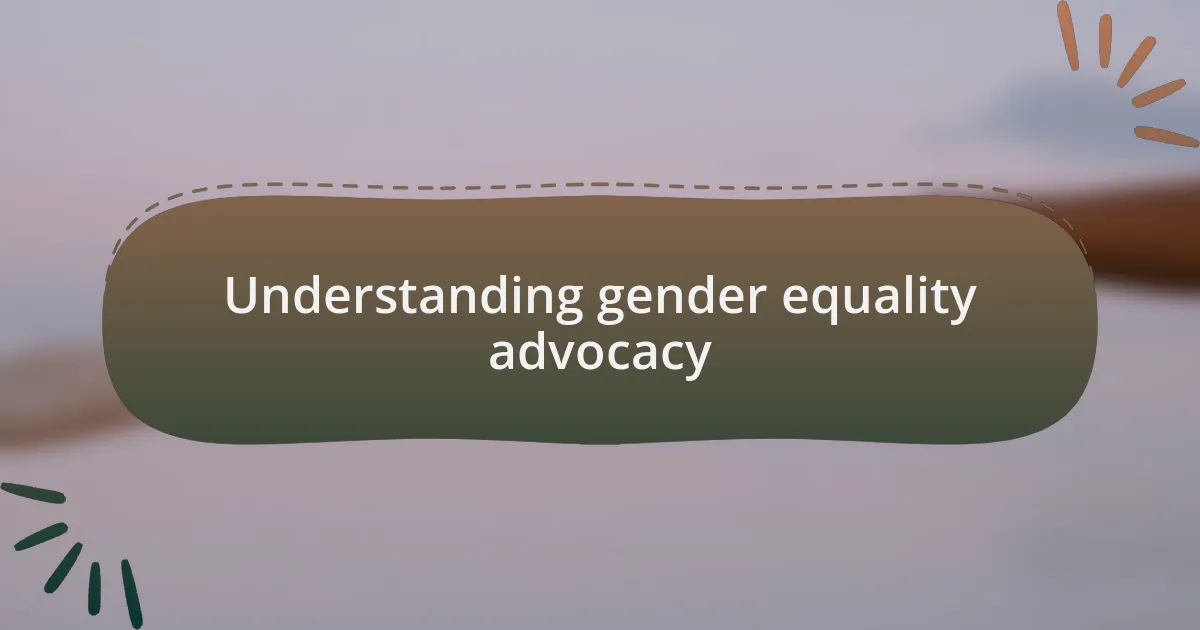
Understanding gender equality advocacy
Gender equality advocacy is about ensuring that everyone, regardless of their gender, has equal rights, responsibilities, and opportunities. I remember the first time I realized the extent of these inequalities; it struck me during a workplace event where women were continuously interrupted while presenting their ideas. This moment highlighted how essential advocacy is, as it pushes for practices that allow everyone’s voice to be heard.
Often, I reflect on how gender roles can shape our daily interactions and expectations. For example, when I see a mother juggling work and household tasks while her partner relaxes, it resonates with me deeply. I think, how present are we in challenging these stereotypes? Advocacy is not just about policies; it’s about changing mindsets and fostering environments where everyone feels valued and supported.
Engaging in gender equality advocacy requires both passion and action. It’s easy to feel overwhelmed by the scale of the problem, yet I remind myself that every small act counts. Whether it’s calling out biases in conversations or educating oneself about gender rights, each step we take contributes to building a more equitable society. Isn’t it empowering to realize that our individual efforts can lead to collective change?
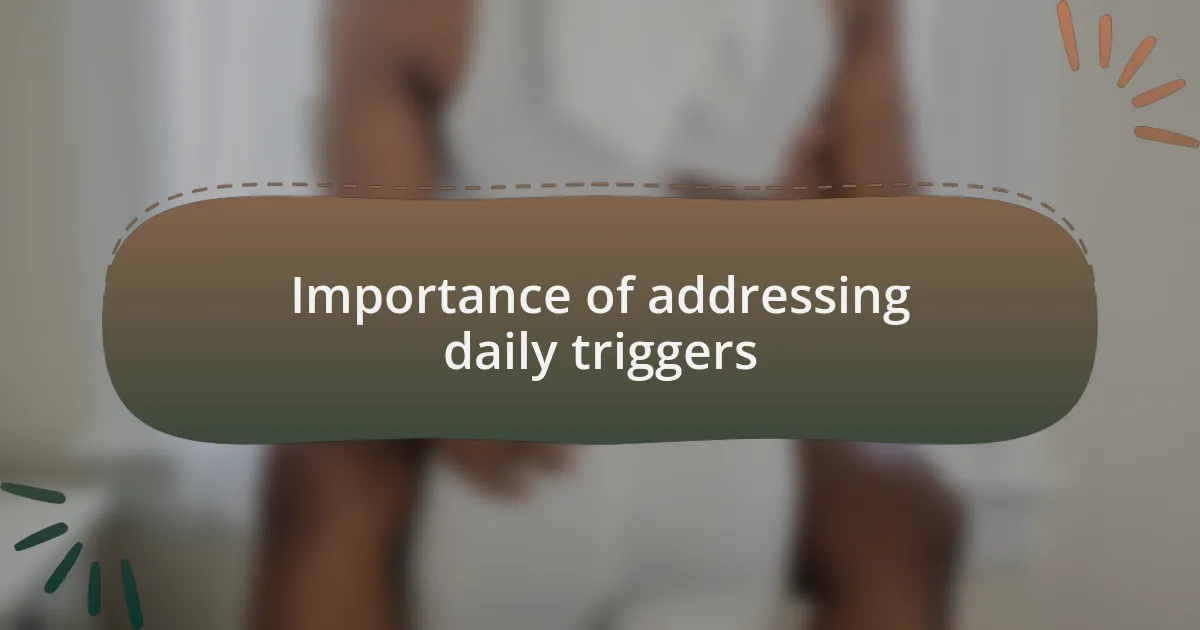
Importance of addressing daily triggers
Understanding and addressing daily triggers is crucial in fostering a healthier mindset, particularly in the context of gender equality. When I encounter subtle biases—like an offhand comment suggesting women are less suited for leadership roles—I feel my emotions rise. This realization compels me to address these moments, as ignoring them only solidifies harmful beliefs. Have you ever considered how the small remarks we let slip by can shape our collective perception?
By actively confronting triggers, we not only advocate for ourselves but also set an example for others. I recall a time in a team meeting when I challenged a stereotype that implied inadequacy based on gender. It was empowering, not just for me but for my colleagues, who later expressed appreciation for addressing the norms often left unspoken. Isn’t it inspiring to think that by speaking up, we can encourage others to do the same?
Furthermore, addressing daily triggers helps cultivate resilience. I have learned to pause and reflect when faced with uncomfortable situations, asking myself, “What can I do differently next time?” This practice has transformed my response to triggers from reactive to proactive. It reminds me that each encounter is an opportunity for growth—not just for myself, but for everyone around me. How can we encourage more people to embrace this journey?
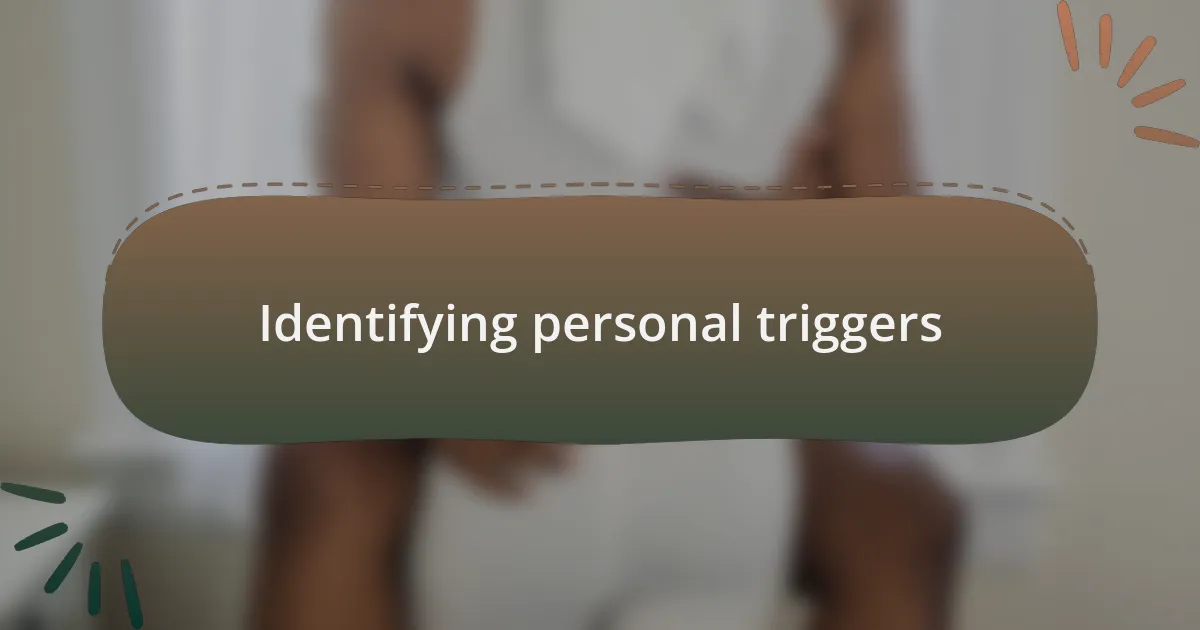
Identifying personal triggers
Identifying personal triggers starts with self-awareness; noticing when something makes me uncomfortable is the first step. I vividly remember a time I felt a knot in my stomach when a colleague dismissed a woman’s idea in a brainstorming session. That moment stood out to me, not because it was overtly aggressive, but because it was so subtle—yet damaging. Have you ever felt that tightness, where your instinct tells you something isn’t quite right?
When I take a moment to reflect, I realize my triggers often stem from societal norms and expectations around gender roles. For instance, during casual conversations, I sometimes notice a tendency to interrupt women more than men. Acknowledging this pattern felt like peeling back layers of a personal bias I wasn’t aware of. It makes me question: how often do we unconsciously participate in behaviors that reinforce gender inequalities?
Through journaling about my daily experiences, I’ve found clarity in pinpointing these triggers. By recording moments that evoke strong emotions, I’ve created a roadmap of my reactions. I recall writing about an instance where I felt frustrated when a male peer took credit for a joint project; capturing that feeling helped me understand my passion for equity. Isn’t it interesting how documenting our experiences can unveil our deeper values and triggers?
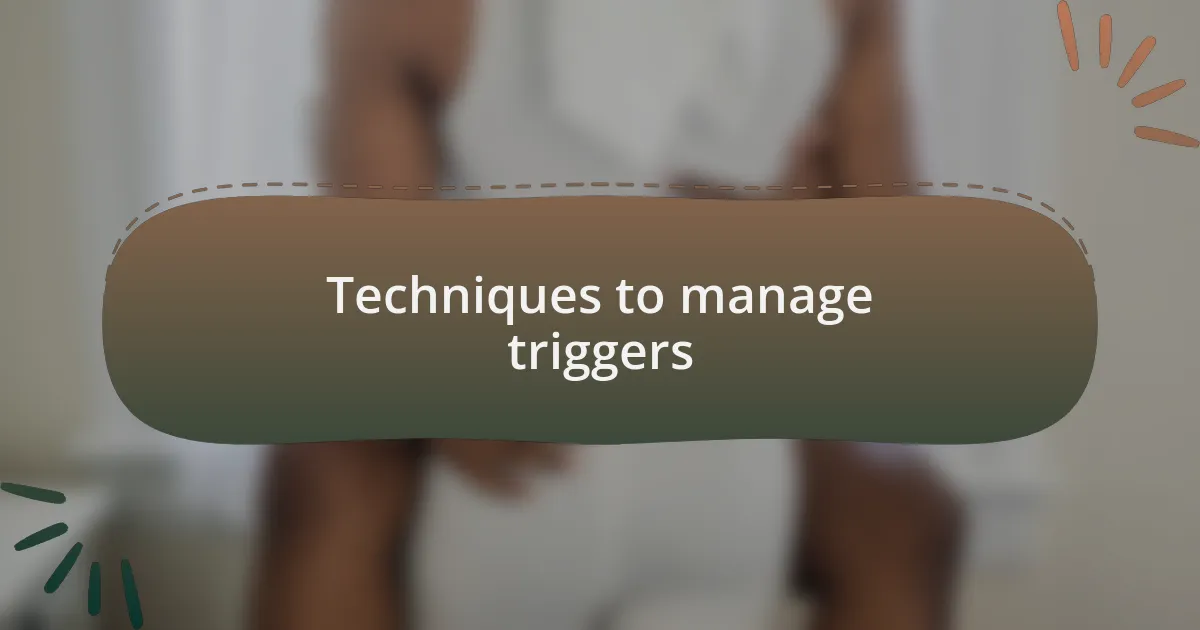
Techniques to manage triggers
When I encounter a trigger, I often use a simple breathing technique to regain my composure. It’s amazing how just a few deep breaths can serve as a reset button. For instance, I once found myself feeling overwhelmed during a meeting when an inappropriate joke was made about a woman’s capabilities. Focusing on my breath helped me ground myself instead of reacting impulsively. Have you ever noticed how a deliberate pause can create space for clarity?
Another technique I rely on is reframing my thoughts. Instead of letting a trigger define my experience, I ask myself, “What can I learn from this?” For example, I was once in a discussion where someone invalidated my perspective on a project. Initially, it stung, but then I reframed the situation. It became an opportunity to strengthen my resolve in advocating for balanced representation. Would you consider doing this when faced with a similar situation?
Lastly, connecting with trusted individuals can be incredibly cathartic. When I feel triggered, sharing my experience with a friend who understands my advocacy work often helps me process my emotions. I remember discussing a moment when a colleague dismissed my contributions during a presentation; talking it out not only provided relief but also reinforced my determination to challenge such behaviors. Do you have someone you confide in during challenging times?
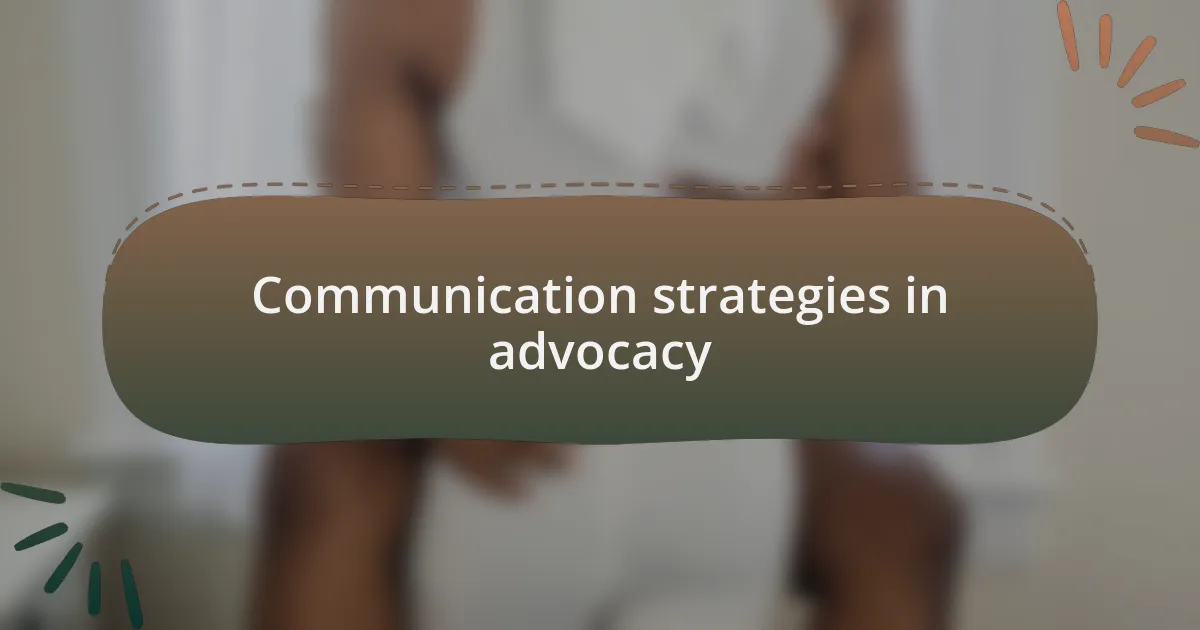
Communication strategies in advocacy
Effective communication strategies in advocacy are vital for fostering understanding and building alliances. I’ve learned that active listening plays a crucial role in my interactions. Once, during a community forum, I made a conscious effort to listen intently to differing viewpoints. This approach not only made others feel heard but also opened up avenues for constructive dialogue. Have you ever noticed how deeper listening can transform a discussion?
Moreover, I often emphasize storytelling in my advocacy work. Sharing personal experiences creates a powerful connection with my audience. I recall sharing a story about a woman who faced discrimination in the workplace during a campaign; it sparked an immediate emotional response and motivated others to engage. Isn’t it fascinating how personal narratives can illuminate broader issues and drive change?
Lastly, I prioritize clarity and simplicity in my messaging. When I first began advocating for gender equality, I noticed that jargon often alienated my audience. By stripping down my messages to their core, I find it becomes easier for others to grasp complex ideas. For instance, explaining the concept of the gender pay gap with relatable examples has led to more meaningful conversations. How clear are the messages you share in your advocacy efforts?
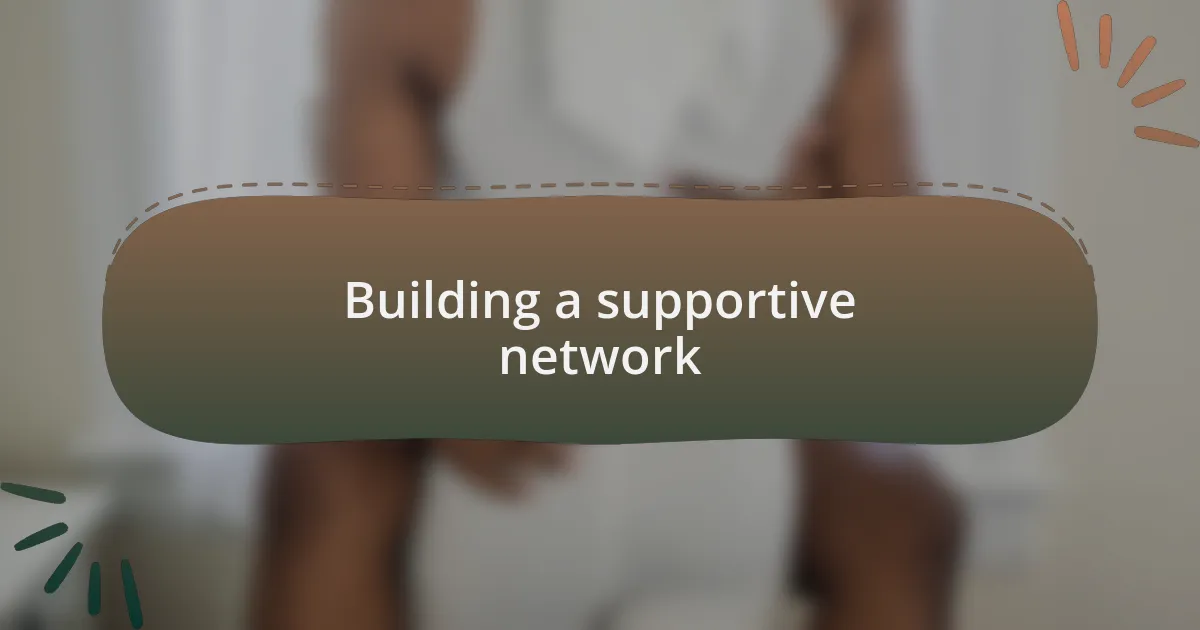
Building a supportive network
Surrounding myself with a supportive network has been one of the most transformative steps in my advocacy journey. I vividly remember joining a local women’s group where the sense of camaraderie instantly lifted my spirits. Sharing experiences and challenges with like-minded individuals not only provided emotional support but also offered practical advice I had never considered before. How much more empowered do you feel when there are others standing shoulder to shoulder with you?
In addition to finding peers, I’ve realized the importance of mentorship. One memorable mentor I had taught me the ropes of navigating difficult conversations with confidence. She often reminded me that having someone in your corner can amplify your voice and lend credibility to your cause. Can you think of a mentor who has shaped your perspective on advocacy?
Lastly, I can’t stress enough the value of diversity within my network. Connecting with individuals from different backgrounds has enriched my understanding of the complexities surrounding gender equality. Just last month, in a discussion with activists from various cultures, I encountered perspectives that challenged my own assumptions. Isn’t it incredible how a shared goal can lead to deeper insights when diverse voices come together?
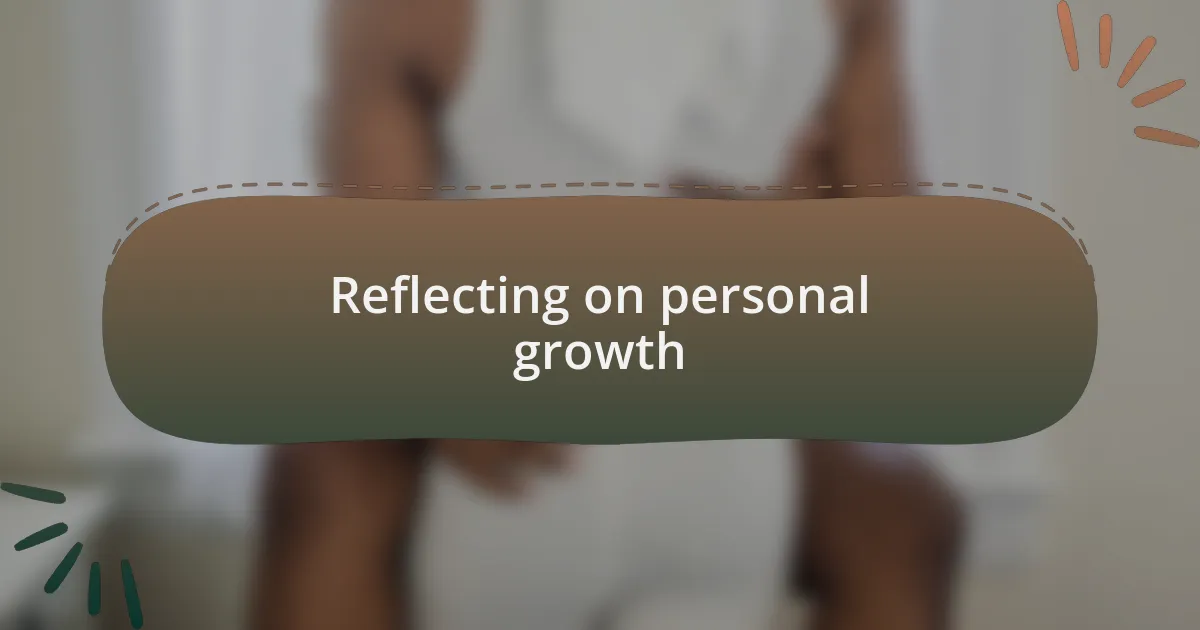
Reflecting on personal growth
Reflecting on my personal growth has been a profound journey. I remember the early days of my advocacy when I often felt lost and overwhelmed. It was through acknowledging my triggers and emotions that I began to understand how those experiences shaped my perspective on gender equality. Have you ever taken a moment to reflect on how your past influences your present?
As I navigated various challenges, I realized that my growth was tied to my willingness to confront uncomfortable feelings. Once, during a particularly heated discussion about gender stereotypes, I could feel my anxiety bubbling to the surface. I took a deep breath, reminding myself of the progress I had made, which allowed me to articulate my thoughts more clearly. Isn’t it fascinating how our emotional responses can hold valuable lessons if we choose to explore them?
Through this process, I’ve learned the importance of self-compassion. There were times I felt frustrated with myself for not having all the answers, but those moments of doubt became catalysts for deeper understanding. Embracing my imperfections has truly allowed me to grow, both personally and as an advocate. How do you show kindness to yourself during your own growing pains?